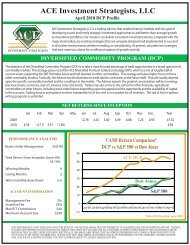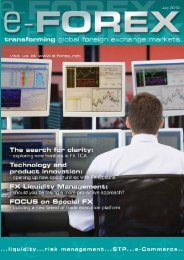You also want an ePaper? Increase the reach of your titles
YUMPU automatically turns print PDFs into web optimized ePapers that Google loves.
markets are understood as clearly as possible. The<br />
markets have witnessed over 25 years of derivatives<br />
and OTC growth which has delivered enormous<br />
economic benefits.<br />
But these benefits have also carried substantial risk.<br />
Many risks associated with derivatives can be<br />
mitigated through employing robust, scalable, and<br />
transparent technological solutions that help to<br />
accurately reflect market prices. This can be supported<br />
by better, more robust and resilient industry<br />
frameworks and infrastructures.<br />
As such, there is a useful and healthy role for regulators<br />
to review and monitor the activities of those they<br />
regulate. However it is important that the regulatory<br />
authorities act with caution and in consultation with<br />
knowledgeable market participants before acting in a<br />
way that may ultimately be costly to all.<br />
Regulating swaps, as the US authorities are proposing,<br />
is absolutely the right thing to do as these are<br />
standardised instruments. However, extending this<br />
model to all OTC derivatives and overburdening the<br />
regulation of <strong>com</strong>plex options simply won’t work.<br />
That would reduce the ability to create specific<br />
hedging instruments which are useful to help<br />
<strong>com</strong>panies manage their risk.<br />
The value of derivatives lies in the fact that they allow<br />
market participants to take security on underlying<br />
assets rather than having to invest cash upfront.<br />
The debate and focus should be about how<br />
investment and risk management decisions are taken<br />
by individual institutions, not OTC derivatives<br />
instruments themselves. It is important that we have<br />
an environment where the risk factors for doing<br />
business across the financial markets are understood as<br />
clearly as is reasonable.<br />
The derivatives industry in Europe is certainly in<br />
need of a better, more robust and resilient<br />
industry framework and infrastructure.<br />
Overwrought regulation could hamper<br />
investment and <strong>com</strong>merce just<br />
when markets need them most of<br />
all. Regulations that increase<br />
trust and ,ultimately,<br />
liquidity can only be good<br />
for the market.<br />
>>><br />
The derivatives industry has strong foundations which<br />
will enable it to successfully address current issues. We<br />
champion accuracy in pricing – this is what the<br />
market needs. Technology is part of the answer but<br />
this cannot be done overnight.<br />
Exchange traded derivatives<br />
Moving derivatives onto an exchange would result in<br />
market participants having to post large amounts of<br />
cash with the exchange to secure their hedging. Some<br />
instruments are ideally suited to exchange trading,<br />
notably the simpler options structures which can be<br />
<strong>com</strong>moditised onto an e-trading system, much as has<br />
happened with spot FX and other simpler<br />
instruments.<br />
But more<br />
advanced and<br />
customisable<br />
FX instruments<br />
are simply not<br />
suited to<br />
exchanges, chiefly<br />
because they are<br />
just that - nonstandard<br />
- and they<br />
require an OTC<br />
market. Companies<br />
january 2010 e-FOREX | 17










